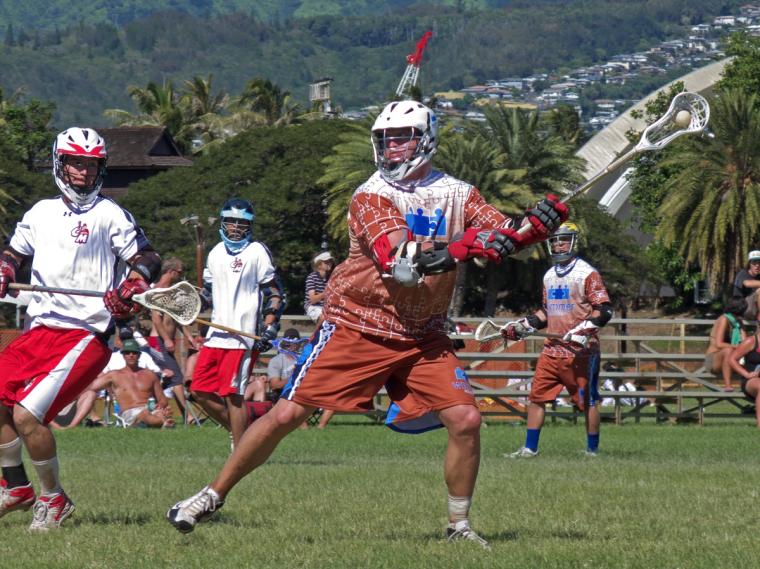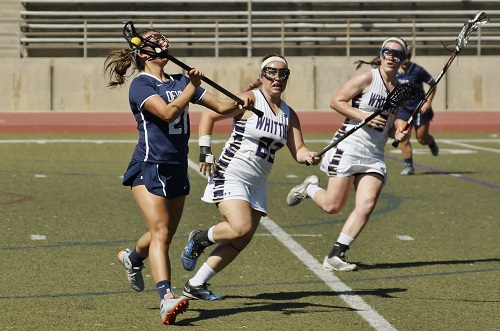
Lacrosse wants a piece of the 2028 Olympics, and it isn’t messing around.
This past week, its world governing body accepted six new national federations, meaning, yes, six countries officially will be able to field teams of their own., potentially at the Olympic level.
According to Inside The Games, Benin, Burkina Faso, Ivory Coast, Malta, Sierra Leone and Togo were admitted to World Lacrosse; since the start of 2022, the governing body has welcomed 12 members, bringing its total up to 85 nations.
The fact that the new group of members comes largely from Africa is a point of pride for World Lacrosse, which has been working to grow the game on that continent.
But that’s not all. World Lacrosse is tinkering with the game itself, and what it is likely to use, should it reach the Olympics, is a small-sided, more TV-friendly format called sixes.
Six-a-side lacrosse, says USA Lacrosse, was used in the World Games in Birmingham last summer. It is played on a smaller field (70 x 36 meters), with fewer players, a condensed game (four 8-minute quarters) and a 30-second shot clock.
The small-sided format is also popular on the youth tournament level since it takes up less field space, allowing more games to be held in one location. Additionally, it is a favored format among youth coaches since it lends itself to better player development, with more ball time and less running. (In that sense, it is similar to 3x3 basketball, in which athletes must play both offense and defense.)
 It is likely that not everyone will be a fan of the format; lacrosse, after all, is a sport steeped in tradition and the pace of play in sixes is something to which longtime athletes will need to become acclimatized. It is unlikely to be a sport that will show up on the varsity level on college campuses. Or high school campuses, come to think of it.
It is likely that not everyone will be a fan of the format; lacrosse, after all, is a sport steeped in tradition and the pace of play in sixes is something to which longtime athletes will need to become acclimatized. It is unlikely to be a sport that will show up on the varsity level on college campuses. Or high school campuses, come to think of it.
Where might it be popular, though? In adult rec leagues. Many student athletes, having played lacrosse throughout their high school (and possibly college) years, often find themselves missing it after graduation. The sixes format makes it easier to form teams who can play one another; finding enough friends to form a team in sixes is simple; finding enough friends to make up a team in the traditional format of 11 players is not so easy. (Club or intramural programs could also have success with sixes.)
But for World Lacrosse, with the big goal of the Olympics, sixes has another obvious advantage: a lower head count per team. The Los Angeles 2028 Games will have a cap of 10,500 athletes in total, so sports with fewer athletes have an advantage.
Lacrosse is one of nine sports on the IOC’s shortlist along with baseball/softball (counted as one lobby), cricket, breaking, flag football, karate, kick boxing, motor sport and squash.
A decision is expected to be made at the October 15-17 session in Mumbai, according to Inside The Games.
Lacrosse has not been a medal event in the Games since 1908 (2028 would make 120 years, if you’re keeping track.)
What could hurt the sport’s chances at Olympic inclusion? Competition for one (there’s plenty of it.) And the IOC has stated repeatedly that it wants sports that draw a youthful demographic (witness its choice of breaking as one of the showcase sports in Paris.)
There’s also another problem. The Baltimore Banner notes:
“There is a thorny, multi-layered cultural issue in play. The Haudensonee, more commonly known as the Native Americans of the Iroquois Confederacy, are considered the originators of the game, and they have had the world’s third-best men’s team over the past decade and arguably the world’s best pro player in Lyle Thompson. The Iroquois have been part of world lacrosse championships for decades, but neither they nor any indigenous nation are recognized by the IOC. The sticking point has already led to substantial debate about the Iroquois’ potential future in the Olympics.”
And while that might not hurt lacrosse’s chances, the fact that it could be viewed as either cultural appropriation or as disregard for the sport’s heritage does it no favors, either.

